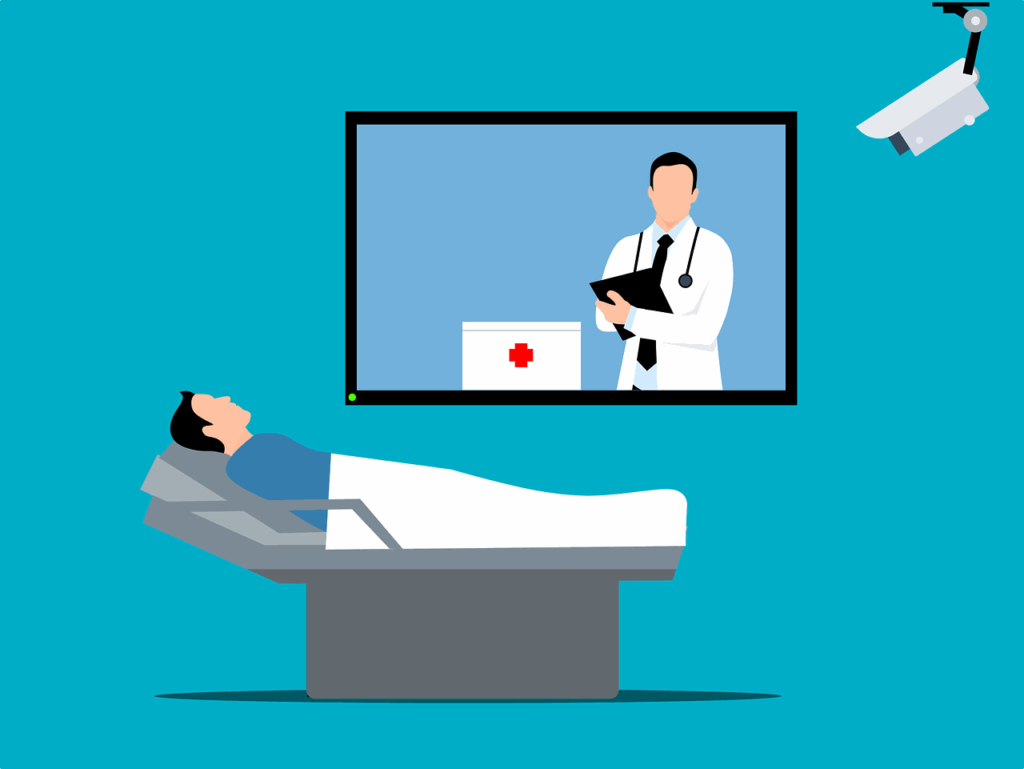What do you think about the idea of consulting a doctor from the comfort of your own home? As the world embraces the convenience of digital communication, telemedicine has become a prominent way of delivering healthcare services. But while the benefits are apparent, there are underlying concerns that often go unnoticed, particularly those related to liability.

Understanding Telemedicine and Liability
Telemedicine allows healthcare professionals to provide medical advice and services remotely, making healthcare more accessible and convenient for patients. Despite its rising popularity, the emergence of telemedicine has brought forth significant liability concerns that both healthcare providers and patients must carefully navigate.
The Need for Professional Liability Insurance
With the increasing adoption of telemedicine, medical professionals must consider professional liability insurance, often referred to as malpractice insurance. This type of coverage protects healthcare providers against claims of negligence and other errors related to patient care, even when services are offered remotely. Understanding its importance can help ensure that you’re prepared for unforeseen situations.
The Evolution of Professional Liability Insurance
Just as telemedicine has evolved, so too has professional liability insurance. Over the years, insurers have adapted their coverage to address emerging risks associated with remote healthcare practices. It’s essential to stay informed about these developments to ensure you’re getting the right coverage to protect yourself.
How Professional Liability Insurance Differs from General Liability
Understanding the distinction between professional liability insurance and general liability insurance is crucial for professionals in the medical field.
| Aspect | Professional Liability Insurance | General Liability Insurance |
|---|---|---|
| Coverage | Protects against claims of negligence and malpractice | Protects against bodily injury and property damage |
| Applicability | Health professionals and consultants | General business activities |
| Claim Example | Misdiagnosis during a telemedicine consultation | Slip and fall on business premises |
This table breaks down the differences to help you understand what type of coverage is relevant to your situation.
The Role of Professional Liability in Business Continuity
Business continuity is crucial for ongoing operations, especially in telemedicine. If a claim is made against you, having professional liability insurance can help mitigate the financial burden, allowing you to focus on your practice without the constant worry of impending lawsuits.
Evaluating Your Need for Professional Liability Coverage
As a healthcare provider engaged in telemedicine, assessing your coverage needs involves considering the scope of services offered, the patient demographic, and potential risks.
- Scope of Services: Are you providing general consultations, or are you specializing in high-risk areas such as mental health or complex chronic diseases?
- Patient Demographic: Are you catering to a younger audience who might rely heavily on digital services, or are you dealing with high-risk patients who may contribute to a higher liability risk?
By evaluating these factors, you can determine whether additional coverage is warranted.
Tailoring Liability Insurance for the Tech Industry
As telemedicine relies heavily on technology, special attention should be paid to how liability insurance is tailored for tech professionals within the healthcare sector. Ensure your policy enhances data protection, addresses software-related risks, and covers any technology failures that may impact patient care.
Liability Insurance Needs for Healthcare Providers
Healthcare professionals must be aware of the specific risks associated with telemedicine, including patient privacy concerns and the accuracy of the medical advice delivered during virtual appointments. Coverage needs will vary depending on your specialty, so it’s essential to conduct a thorough assessment of your potential exposure.
Insurance Challenges in the Construction Sector
Interestingly, while it may seem unrelated, understanding liability insurance in the construction sector can shed light on broader principles applicable to telemedicine.
The Unique Considerations for Legal Professionals
Legal professionals often face distinct liability challenges, particularly with the escalation of remote consultations. Insurance must address unique circumstances that arise from digital communication and the complexities of providing legal advice online.
The Impact of AI on Professional Liability Policies
Artificial Intelligence (AI) is rapidly changing the liability landscape. In telemedicine, the use of AI for diagnostics or treatment recommendations poses specific risks that may not be fully understood or covered in traditional policies. Therefore, examining how your insurance adapts to viral technologies is paramount.
Cybersecurity Threats and Their Influence on Insurance Needs
With telemedicine’s growing popularity, cybersecurity threats have become a prevalent concern.
How Climate Change Affects Liability Risk Assessments
You might not think climate change has connection to telemedicine, but both are interlinked through liability concerns. Telemedicine plays a role in emergency response and disaster management, so an understanding of how climate-related risks can affect your practice will aid in liability assessments.
Social Engineering: A Growing Concern for Insurers
In the realm of telemedicine, social engineering attacks targeting patient data can lead to significant liability for healthcare providers. Insurers are beginning to account for these risks in their coverage options, making it critical for professionals to remain informed about evolving threats and necessary safeguards.
Navigating the Hard Market in Professional Liability
A hard insurance market can create challenges when seeking coverage. High demand and limited capacity often drive up costs, making it essential to be well-prepared and informed prior to negotiations with insurers.
Lessons from High-Profile Professional Liability Lawsuits
Examining high-profile lawsuits can provide invaluable lessons on the importance of robust liability coverage. Understanding what actions led to claims and how they were addressed can help you navigate your own risk management practices.
How Large Corporations Manage Their Liability Risks
Large healthcare corporations often implement complex risk management strategies to mitigate liability. You can adopt similar strategies by developing comprehensive plans that include thorough documentation and patient communication approaches.
Case Study: Successful Claims Mitigation Strategies
Looking into specific case studies of successful claims mitigation can provide practical lessons. For example, a telemedicine provider faced a malpractice lawsuit due to a misdiagnosis. By demonstrating effective protocols and patient engagement techniques, they successfully defended the claim.
The Financial Impact of Negligence Claims on Small Businesses
Negligence claims can be particularly damaging for small healthcare practices. It’s essential to consider the financial implications and plan accordingly through proper insurance coverage to keep your practice secure.
A Step-by-Step Guide to Filing a Professional Liability Claim
If you find yourself needing to file a claim, having a clear process is vital. Here’s a simple breakdown:
- Document the Incident: Write down details of the claim, including when, where, and how it occurred.
- Notify Your Insurer: Contact your insurance provider as soon as possible to inform them about the situation.
- Gather Evidence: Collect any supporting documentation to help substantiate your case.
- Communicate with All Parties Involved: Maintain open lines of communication with your insurer to keep them updated.
- Assess Coverage Limits: Consider your professional environment and the potential risks you face when choosing limits.
- Review Exclusions: Understand what is not covered to avoid surprises down the line.
- : Choose policies that allow you to adapt as your business grows.
By understanding your needs and tailoring your policy accordingly, you can protect yourself effectively.
Knowing your policy limits and deductibles is crucial in ensuring adequate coverage. A low deductible might mean higher premiums, but it also reduces your out-of-pocket costs in case of a claim.
Tips for Negotiating Better Terms with Your Insurer
When approaching your insurer, be sure to:
- Present comprehensive information about your practice.
- Clearly communicate your risk management strategies.
- Be prepared to negotiate limits and exclusions based on your unique needs.
Educating Employees About Liability Risks
Providing training for your staff can immensely reduce your risk exposure. It’s important that everyone understands their role in maintaining compliance, managing data securely, and ensuring effective communication with patients.
Exploring Niche Markets for Professional Liability Coverage
As telemedicine continues to expand, niche markets are emerging. Be proactive in identifying specific coverage needs tailored to your specialization to stay ahead of evolving risks.
Customizing Policies for Emerging Industries
If you’re involved in a growing industry related to telemedicine, such as digital mental health platforms, finding the right policy can ensure you are well-protected against unique risks.
The Role of Professional Associations in Shaping Coverage Needs
Joining professional associations can be beneficial for understanding best practices in liability coverage. These organizations often provide valuable resources, advocacy, and insights relevant to your field.
Risk management plays a pivotal role in minimizing liability exposure. Implement a risk management plan that includes regular reviews of your procedures and practices to identify and mitigate potential threats.
Professional Liability Insurance 101: A Beginner’s Guide
If you’re new to professional liability insurance:
- Understand Key Terms: Familiarize yourself with terms like “claims-made” and “occurrence policies.”
- Recognize the Importance of Coverage: Acknowledge that having insurance isn’t just about meeting requirements; it’s about protection.
By addressing these basics, you’ll feel more empowered when making decisions about your coverage.
Key Terms and Definitions in Professional Liability Insurance
Some key terms you should be aware of include:
- Deductible: The amount you agree to pay before the insurance starts to cover costs.
- Policy Limit: The maximum amount your insurer will pay for a covered claim.
Understanding common exclusions is vital:
- Intentional Misconduct: Claims arising from intentional actions may not be covered.
- Contractual Liability: Agreements outside the scope of general practice might create liability that typical policies won’t cover.
The Role of Risk Management in Mitigating Liability
Implementing effective risk management strategies can greatly reduce your exposure to liability. Reviewing operational procedures regularly will help to identify areas for improvement.
Factors Affecting Professional Liability Premiums
Several elements can influence the cost of your professional liability insurance:
- Your Specialty: Certain fields, such as surgery or emergency medicine, may attract higher premiums.
- Claims History: A history of claims can increase your rates, highlighting the importance of minimizing risk.
Understanding Claims-Made vs. Occurrence Policies
- Claims-Made Policies: These only cover claims made while the policy is active, emphasizing the importance of maintaining coverage continuity.
- Occurrence Policies: These cover any incident that occurs during the policy period, regardless of when the claim is filed.
Choosing between these two types of policies forms a critical part of your decision-making process.
The Importance of Adequate Coverage Limits
Having adequate coverage limits is crucial to protect against potential financial losses from liability claims. Assess your unique risks and ensure your limits reflect your exposure.
Choosing the Right Deductible for Your Business
Selecting the appropriate deductible depends on your financial situation. A higher deductible often results in lower premiums but a greater out-of-pocket expense in the event of a claim.
The Impact of Prior Claims on Future Insurability
Previous claims can impact your insurability. Understanding how insurers evaluate your claims history may help improve your chances of securing favorable terms in the future.
When to Review and Update Your Liability Coverage
Regular reviews of your liability coverage are essential. Consider alterations in your practice, emerging risks, and changes in law to determine whether you require adjustments to your policy.
The Role of Brokers and Agents in the Insurance Process
Navigating the insurance process can be complex, making the role of brokers and agents invaluable. They can provide guidance on specific needs and help find tailored coverage options.
Tips for Communicating with Your Insurer
Open communication with your insurer fosters a smoother experience. Be transparent about your operations and maintain regular dialogue on any changes that may impact liability.
Professional Liability for Accountants: Beyond the Numbers
Architects and Engineers: Building a Strong Insurance Foundation
These professionals face unique risks tied to project design and safety standards. Depending on the nature of projects handled, selecting the right insurance policy is vital for long-term sustainability.
Attorneys at Law: Protecting Your Practice from Malpractice Claims
Legal professionals are often under immense scrutiny. Having a robust professional liability policy can safeguard against claims of negligence, helping to protect both reputation and financial stability.
Consultants should consider how their role impacts their liability. Miscommunications can lead to errors, so ensuring effective coverage is critical in protecting your business.
Dentists: Navigating the Complexities of Liability Insurance
Unique risks face dental professionals, particularly with procedures and patient confidentiality. Being proactive in obtaining adequate insurance can shield you from potential claims related to treatment or patient dissatisfaction.
Financial Advisors: Shielding Your Clients’ Investments

Healthcare Professionals: The Importance of Malpractice Insurance
Healthcare professionals engaging in telemedicine must understand the necessity of malpractice insurance, especially given the nuanced risks associated with virtual consultations.
IT Professionals: Mitigating Cyber Risks and Data Breaches
As an IT professional, you face unique challenges in protecting client data. Cyber liability insurance should be a vital part of your risk management strategy in telemedicine.
Even insurance agents have specific liability considerations, especially when navigating claims and policies. Ensuring you have adequate coverage can lead to long-term stability in your firm.
Real Estate Agents: Avoiding Liability in Property Transactions
Tech Startups: Tailoring Coverage for Emerging Risks
The landscape for technology-oriented practices is ever-evolving. Stay proactive in understanding unique risks and tailor your liability insurance accordingly.
Nonprofits: Addressing Unique Liability Concerns
Nonprofit organizations face their own set of liability considerations, especially related to volunteer work and public engagement. Having the correct insurance safeguards against potential risks.
Media and Entertainment: Managing Risks in a Creative Field
In creative industries, liability risks often arise from copyright infringement or contractual disputes. Adequate coverage can help protect against unforeseen claims associated with media production.
Hospitality Industry: Protecting Your Guests and Reputation
The hospitality industry deals with unique risks tied to guest safety and satisfaction. Having proper liability coverage is essential to maintaining operations and reputation.
Educational Institutions: Liability Concerns in Academia
Schools and universities should understand the complexities of liability in education, especially concerning student interactions and educational standards.
The Rise of Cyber Liability: Protecting Against Digital Threats
As organizations increasingly rely on technology, cyber liability coverage has become paramount. Especially in settings like telemedicine, safeguarding against data breaches and cyber risks is critical.
The Impact of AI on Professional Liability: New Risks and Opportunities
With AI technologies evolving rapidly, it’s vital to address how your policies may need to adapt to include these emerging risks while recognizing the potential opportunities they present.
Climate Change and Liability: Assessing Evolving Risks
Climate-related lawsuits and claims are becoming more common. Evaluating your exposure to these risks will ensure comprehensive and effective liability management.
Social Engineering: The Human Factor in Liability Claims
Understanding the growing threat of social engineering is essential in telemedicine contexts. Regular training for your team can significantly reduce the risk of falling victim to these schemes.
Navigating the Hard Market: Strategies for Securing Coverage
In a tough market, insurers may be more selective. Having a solid understanding of your practice and how to present it can improve your chances of obtaining favorable coverage.
The Gig Economy: Liability Considerations for Freelancers and Contractors
The gig economy brings unique challenges for freelancers. Understand how different insurance needs arise and ensure you secure the appropriate coverage for your line of work.
Telemedicine: Addressing Liability Concerns in Remote Healthcare
Engaging with telemedicine means being aware of specific liability issues that can arise from remote care. Ensuring comprehensive coverage that specifically addresses these risks will empower you to practice more effectively.
Remote Work: The Impact on Professional Liability Risks
The shift to remote work can alter liability landscapes, introducing new variables that must be carefully assessed when evaluating coverage.
Evolving Regulatory Landscape: Staying Compliant with Insurance Requirements
Compliance to regulations is essential in the healthcare industry. Keep abreast of changes to ensure your liability insurance stays relevant and effective.
The Role of Data Privacy in Liability Insurance
With patient data paramount to telemedicine, understanding its role in liability insurance is crucial. Adequate data protection coverage can prevent significant financial losses.
Mental Health Professionals: Addressing Unique Liability Concerns
The Impact of Social Media on Reputation and Liability
Your online presence can significantly impact your practice’s reputation. Appropriately managing your social media is key to mitigating liability risks.
Professional Liability in the Age of Globalization
As professional services become more interconnected globally, liability risks evolve. Understanding international laws related to liability will help you stay ahead of potential claims.
Drones and Autonomous Vehicles: New Liability Frontiers
Emerging technologies like drones and autonomous vehicles bring fresh liability concerns. Assessing how these technologies interact with your practice can be crucial in securing appropriate coverage.
The Future of Professional Liability Insurance: Predictions and Trends
As industries evolve, so do the risks associated with them. Staying informed about insurance trends helps you adapt your policies to remain protected.

Creating a Culture of Risk Awareness: Employee Training and Education
Establishing a culture of risk awareness within your organization can proactively mitigate liability exposure. Regular training and education help employees recognize and address potential risks effectively.
Implementing Effective Risk Management Strategies
Take actionable steps toward developing risk management strategies that suit your unique practice. Regular assessments and updates will keep your approach effective.
Developing Comprehensive Incident Response Plans
When incidents occur, having a comprehensive response plan can streamline your actions and minimize liabilities associated with breaches or claims.
The Importance of Documentation in Liability Claims
Accurate documentation is vital when addressing potential claims. Maintain clear and comprehensive records to back up your practices and mitigate risks effectively.
Best Practices for Client Communication and Engagement
Good communication fosters trust and transparency with your clients, reducing potential claims related to misunderstandings. Establish protocols to engage effectively with patients.
Managing Conflicts of Interest to Minimize Risk
Understanding and managing conflicts of interest is key to minimizing liability exposure. Ensure you have policies in place that recognize and address these concerns.
Utilizing Technology to Enhance Risk Management
Leverage technology to streamline your risk management processes. Tools can help automate tracking, communication, and documentation efforts, leading to reduced exposure.
The Role of Internal Audits in Loss Prevention
Regular internal audits help identify areas for improvement in your practice. Catching issues early can significantly reduce potential liability claims.
Case Studies: Lessons Learned from Liability Claims
Studying past liability claims within your industry can offer valuable insights. Recognizing the factors leading to claims and addressing them in your practice can help you avoid similar pitfalls.
Expert Insights: Interviews with Risk Management Professionals
Engaging with risk management professionals allows you to gain practical insights applicable to your practice, enhancing your liability understanding and preparation.
Avoiding Common Pitfalls: Tips for Reducing Liability Exposure
Taking preventive measures can significantly lower your risk of liability claims. These include regular staff training, clear communication with patients, and maintaining thorough documentation.
The Importance of Continuous Improvement in Risk Management
Risk management is not a one-time task; it requires ongoing efforts and adaptability to new risks and challenges. Evaluating your approach regularly ensures that you stay aligned with best practices.
Creating a Safe and Secure Work Environment
Safety and security should be priorities in your practice. Implementing operational best practices creates an atmosphere focused on patient safety and satisfaction.
Managing Third-Party Risks: Vendors and Contractors
Involving third parties in your practice comes with its own set of risks. It’s important to conduct due diligence before engaging vendors to minimize liability exposure.
The Role of Professional Associations in Risk Management
Professional associations can be incredibly valuable in shaping best practices for risk management. Engaging with these organizations offers insights and resources necessary to navigate liability effectively.
Understanding the Claims Notification Process
Familiarizing yourself with the claims notification process ensures you react appropriately if faced with a liability claim. Understanding your insurer’s timelines and requirements makes for a smoother experience.
Working with Claims Adjusters: Tips for a Smooth Experience
Claims adjusters play a fundamental role in the processing of liability claims, and working closely with them fosters a transparent and efficient claims experience.
The Role of Legal Counsel in Liability Claims
Having legal counsel available in the event of a claim is essential. A knowledgeable attorney can guide you through complex legal matters, helping you manage your response effectively.
Preparing for Litigation: Key Considerations
Being prepared for potential litigation means having clear strategies in place to respond proactively. This includes staying organized, maintaining documentation, and being ready to communicate promptly.
Mediation and Alternative Dispute Resolution: Options for Resolving Claims
Exploring mediation and alternative dispute resolution methods can lead to favorable outcomes without the need for litigation, saving both time and financial resources.
Expert Witnesses: Their Role in Liability Cases
Expert witnesses can help strengthen your case by providing insights into industry standards and practices. Their testimony may prove critical in demonstrating your adherence to the expected level of care.
Managing the Emotional Impact of a Liability Claim
Liability claims can be emotionally taxing. Prioritizing your well-being and that of your staff is vital during this challenging time.
Case Studies: Analyzing Real-World Claim Scenarios
Specific case studies provide an opportunity to learn from previous liability cases. Reviewing these situations can help improve your practices and preparedness.
The Impact of Litigation on Reputation and Brand Image
Facing a liability claim can impact your reputation. Proactively addressing potential claims transparently communicates your commitment to accountability and patient care.

Protecting Your Business During a Claim: Continuity Strategies
Ensuring business continuity during a claim protects your practice from devastating financial damages. Implement strategies that ensure you can continue to operate effectively throughout the process.
The Role of Public Relations in Managing Liability Crises
Public relations play a pivotal role in managing the narrative surrounding liability claims. Properly navigating communications can safeguard your reputation and clientele.
Lessons Learned from High-Profile Liability Lawsuits
High-profile lawsuits often serve as a wealth of lessons. Evaluate these cases to identify preventative measures you can implement within your practice.
Understanding the Financial Costs of Litigation
The costs associated with litigation can be staggering, underscoring the importance of obtaining adequate liability insurance to protect against such financial burdens.
Strategies for Negotiating Favorable Settlements
Understanding how to negotiate settlements can significantly influence the financial aspects of a claim. Preparation, clear communication, and having legal representation are critical in these negotiations.
The Importance of Post-Claim Analysis and Improvement
Once a claim is settled, conducting a thorough analysis is vital. Learning from the claim experience enables you to improve policies and practices, enhancing future coverage.
The History of Professional Liability Insurance
Understanding the historical evolution of professional liability insurance can offer insights into its significance and future direction. Recognizing changes over time helps you appreciate the breadth of coverage options available.
The Role of Insurance in Economic Growth and Stability
Insurance plays a crucial role in fostering economic stability by providing security against financial losses. Understanding how it ties into healthcare helps pave the way for sustainable practices.
Professional Liability Around the World: International Perspectives
Examining professional liability regulations in a global context can provide insights into best practices. Understanding variations across borders allows you to navigate international telemedicine with confidence.
The Ethics of Professional Liability Insurance
Professional ethics intersect with insurance. Understanding the ethical implications of liability coverage allows for more responsible practices in your profession.
The Impact of Technology on the Insurance Industry
Technology profoundly influences how insurance is conducted, from underwriting to claims processing. Staying informed on these advancements will position your practice favorably within an evolving landscape.
Careers in Professional Liability Insurance
Understanding career options within the professional liability insurance space opens the door to various career pathways, each contributing to industry growth and security.
The Future of the Insurance Industry: Predictions and Trends
Predictions surrounding insurance trends can significantly impact your decisions in coverage. Keeping abreast of these predictions informs your overall risk management strategy.
Book Reviews: Must-Reads for Risk Management Professionals
Numerous resources are available for further insights on risk management practices. Staying informed through literature can enhance your strategies in securing coverage and managing risks.
Infographics and Visual Guides to Professional Liability
Visual resources can simplify complex information. Utilizing infographics to convey vital aspects of liability ensures that you and your team can quickly grasp necessary details.
Webinars and Online Courses: Continuing Education Resources
Investing in continuing education, through webinars and online courses, can heighten your knowledge of risk management, enhancing your overall ability to manage liability effectively.
Podcasts and Interviews with Industry Leaders
Listening to industry leaders discuss their insights and experiences can provide invaluable lessons on managing liability and coverage. Engaging with this content fosters continuous learning.
Conferences and Events: Networking Opportunities
Networking within the industry can provide exposure to unique risks and solutions. Attending conferences and events opens opportunities for learning and collaboration.
Glossaries and Resource Guides: Essential Tools for Professionals
Accessing glossaries and resource guides can clarify essential terms and enhance your understanding of liability insurance, empowering you in discussions with insurers and legal counsel.
Frequently Asked Questions About Professional Liability Insurance
Engaging with FAQs helps demystify common concerns surrounding liability coverage, ensuring that you’re well-prepared as you navigate your insurance options.
Client Testimonials and Success Stories
Hearing positive testimonials and success stories illuminates the value of effective risk management strategies. These accounts can inspire confidence and assist in your coverage decisions.
Humorous Takes on Liability Insurance: Cartoons and Jokes
Sometimes, a little humor can lighten the serious topic of liability insurance. Informing yourself while enjoying content can create a balanced perspective.
Industry News and Updates: Stay Informed About the Latest Developments
Staying updated on industry news ensures that you remain aware of regulatory changes and evolving practices relevant to your liability coverage.
Regulatory Changes and Their Impact on Liability Coverage
Understanding regulatory changes is essential for maintaining compliance and adapting your coverage in line with new standards, ensuring your practice remains adequately protected.
Case Studies: Analyzing Landmark Court Decisions
Reviewing landmark court decisions related to professional liability can illuminate trends in judicial outcomes, offering substantial insights into managing claims.
The Role of Insurance in Social Responsibility and Sustainability
Recognizing the connection between insurance and social responsibility can yield meaningful practices that positively impact your community while remaining compliant.
Thought Leadership: Essays and Opinion Pieces from Experts
Leaders in the field often share their insights on professional liability through essays and opinion pieces—these can provide inspiration and strategies for navigating challenges.

Debunking Myths and Misconceptions About Liability Insurance
Many misconceptions exist around liability insurance. Taking the time to debunk these can clear confusion, ensuring you make informed decisions moving forward.
Interactive Quizzes and Assessments: Test Your Knowledge
Engaging with quizzes offers a fun way to assess your understanding of liability insurance while reinforcing your knowledge about critical areas.
Tips for Marketing and Promoting Your Professional Services
Incorporating marketing strategies into your practice not only elevates your presence but can also enhance client understanding of the importance of liability coverage.
Building a Strong Online Presence: Websites and Social Media
Developing a solid online presence is paramount in today’s digital age. Effectively communicating your services will establish credibility and attract potential clients.
Professional Liability for Medical Device Manufacturers: Navigating Complex Risks
Manufacturers of medical devices face unique liabilities related to product efficacy and safety. Ensuring comprehensive coverage minimizes the risks associated with their innovations.
Insurance Considerations for Architects Designing Sustainable Buildings
Architects venturing into sustainability face unique risks. Understanding coverage options tailored to sustainable practices helps safeguard your projects.
Protecting Your Law Firm from Cyberattacks and Data Breaches
Law firms often hold sensitive client information. Having adequate cybersecurity measures in place helps protect against data breaches that could lead to significant liability claims.
Malpractice Insurance for Nurse Practitioners and Physician Assistants
For nurse practitioners and physician assistants engaging in telehealth, understanding malpractice insurance is critical in protecting against potential claims.
Liability Concerns for Financial Planners and Wealth Managers
Financial planners face unique liability challenges when managing clients’ investments. Adequate coverage ensures that you are protected against claims stemming from potential mismanagement.
Insurance Solutions for Mental Health Professionals in Private Practice
Mental health professionals must navigate liability risks intricately associated with patient care and confidentiality. Specialized insurance coverage can help you manage these concerns.
Cybersecurity Insurance for IT Consultants and Managed Service Providers
As an IT consultant, the importance of cybersecurity insurance cannot be overstated. Protect your practice from potential risks associated with data breaches or system failures.
Understanding Professional Liability for Commercial Real Estate Brokers
Real estate brokers encounter specific liability challenges in property transactions. Seeking appropriate coverage tailored to your brokerage will help minimize exposure to risks.
Tailoring Insurance for Biotech Startups and Pharmaceutical Companies
Biotech and pharmaceutical companies face unique risks related to product safety and regulatory compliance. Adopting specialized policies helps navigate these complexities.
Addressing Liability Risks for Nonprofits Working in Disaster Relief
Nonprofits involved in disaster relief must understand the unique liabilities they face. Obtaining the necessary coverage ensures safety and compliance while tackling community challenges.
Protecting Film Producers and Directors from Production-Related Claims
Film production carries inherent risks related to liability. Having insurance tailored to your productions helps safeguard professionals against potential claims.
Insurance Needs for Event Planners and Hospitality Management Companies
When planning events, liability protection is critical in case of unforeseen incidents. Understanding your coverage needs can help manage risks effectively.
Liability Coverage for Online Educators and EdTech Platforms
Online educators and platforms face unique liability risks linked to their content and student interactions. Understand your exposure and secure appropriate coverage.
Professional Liability for Drone Operators and Aerial Photography Businesses
With increasing reliance on drone technology, operators face unique liabilities. Ensuring you have coverage tailored for the aerial industry is essential.
Insurance Considerations for Companies Developing Artificial Intelligence
Developing AI technologies brings specific liability risks. Adequate coverage will address the unique complexities present in this emerging field.
As VR and AR technologies evolve, so do the liabilities facing content creators. Specializing your coverage will help manage risks associated with these technologies.
Addressing Liability Risks in the Sharing Economy and Gig Platforms
The sharing economy introduces new liability challenges for gig platforms. Understanding coverage options tailored to these relationships ensures adequate protection.
Insurance Solutions for 3D Printing and Additive Manufacturing Companies
Businesses involved in 3D printing face unique liability issues around product safety and intellectual property. Securing comprehensive insurance helps protect your innovations.
Protecting Cryptocurrency Exchanges and Blockchain Technology Providers
Cryptocurrency exchanges and blockchain providers carry specific risks tied to technology and regulation. Tailoring coverage will help navigate the evolving landscape of digital currency.
Professional Liability for Space Tourism and Commercial Spaceflight Ventures
As the frontier of space tourism develops, so do associated liabilities. Understanding and securing appropriate coverage is key to operating within this burgeoning field responsibly.
Insurance Needs for Companies Working with Gene Editing and Biotechnology
Companies engaged in gene editing and the burgeoning biotechnology field must grasp specialized risks that may not be covered under traditional policies.
Environmental consultants face liabilities tied to regulatory compliance and environmental impact. Properly tailored coverage mitigates potential risks in this vital industry segment.
Addressing Liability Risks in the Cannabis Industry
The cannabis sector presents unique legal and liability challenges. Understanding these nuances and securing adequate insurance coverage is essential for success.
Lessons from a High-Profile Medical Malpractice Lawsuit
Analyzing landmark medical malpractice lawsuits can yield critical insight into contemporaneous liability issues. Learning from others helps you navigate similar challenges effectively.
Analyzing a Construction Defect Claim and its Impact on the Contractor
Understanding how construction defect claims contribute to liability can inform your practices within the medical field. Recognizing these complexities creates stronger overall risk assessments.
How a Cyberattack Crippled a Tech Company and its Insurance Response
Learning from a case where a cyberattack severely impacted a tech company can underscore the importance of solid cybersecurity measures and appropriate liability coverage.
Real-World Examples of Social Engineering Scams Targeting Businesses
Understanding how social engineering scams can affect businesses is paramount. Learning from real scenarios can reinforce the importance of cybersecurity training and communication with your team.
Case Study: A Successful Claim Mitigation Strategy in the Healthcare Industry
Studying successful claim mitigation efforts provides practical insights. By analyzing past cases in healthcare, you can develop proactive measures to protect your practice.
How a Small Business Overcame a Negligence Lawsuit and Thrived
Examining how one small business managed to overcome a negligence lawsuit emphasizes the power of resilience and thorough preparation in navigating claims.
Analyzing the Financial Impact of a Data Breach on a Retail Company
The ramifications of a data breach can be catastrophic. Analyzing financial impacts can underscore the necessity of having appropriate insurance in place.
Lessons Learned from a Professional Liability Claim in the Legal Profession
Cross-industry insights provide benefits; learning from a professional liability claim in the legal field can yield lessons applicable to your own practices.
Case Study: The Importance of Risk Management in the Construction Industry
Delving into risk management practices from the construction sector reveals valuable insights transferable to the medical field. Effective management fosters long-term sustainability and protection against claims.
The Role of Behavioral Economics in Understanding Liability Risks
Behavioral economics can illuminate how decision-making influences exposure to liability. Understanding these factors can shape your approach to risk management.
The Intersection of Ethics and Professional Liability Insurance
Recognizing the interplay between ethics and liability ensures your practices align with professional standards while mitigating risks.
The Impact of Globalization on Professional Liability Claims
With ongoing globalization, international liability claims can arise. Awareness of how these claims evolve will aid in maintaining compliance and appropriate coverage.
The Future of Risk Management: Predictive Analytics and AI
Predictive analytics will shape the future of risk management, informing insurance policies and claims management strategies to stay ahead of needs.
The Role of Insurance in Promoting Social Justice and Equity
Insurance can support social equity initiatives, enhancing both community and industry practices. Engaging in meaningful coverage discussions can drive positive change.
Exploring the Psychological Impact of Liability Claims on Professionals
Recognizing the psychological toll of facing liability claims is essential. Supporting mental wellness is vital for professionals navigating these burdens.
The Importance of Transparency and Communication in the Insurance Industry
Emphasizing transparent communication with insurers fosters a smoother processing experience, ensuring a better understanding of policies and responsibilities.
The Role of Professional Associations in Shaping Liability Standards
Professional associations heavily influence liability coverage standards. Participating in these organizations helps professionals stay current with industry expectations and needs.
The Evolution of Risk: Historical Perspectives on Professional Liability
Understanding how perceptions of risk have changed over time provides context for current liability landscapes, enhancing preparedness for future challenges.
The Impact of Emerging Technologies on the Future of Insurance
Emerging technologies are reshaping the insurance landscape. Understanding these developments will position you favorably in obtaining and managing coverage.
With the evolving landscape of telemedicine, understanding liability concerns is more important than ever. By staying informed about your insurance needs and managing risk effectively, you can engage confidently in digital healthcare practices while safeguarding your professional interests. As telemedicine continues to grow, remaining vigilant and proactive will ensure you’re well-prepared for the journey ahead.
